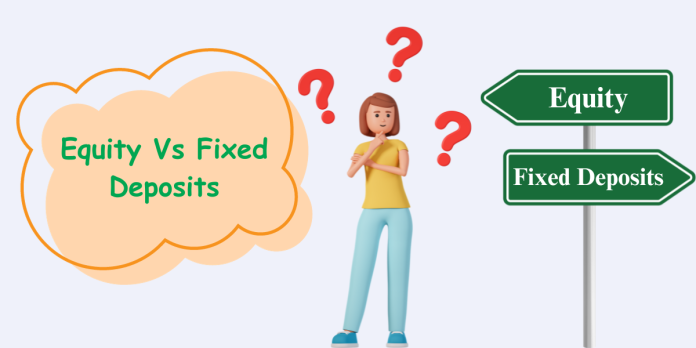Investors often grapple with a pivotal question: do they prioritize risk or return? The choice between being an aggressive or conservative investor boils down to a fundamental decision: the energetic appeal of the stock markets, representing equity investments, versus the secure haven provided by bank-fixed deposits. It’s essentially a decision between embracing the dynamic nature of stocks and seeking potential high returns or opting for the stability and assurance offered by fixed deposits in banks.
For example, Arun Goyal, a middle-aged individual, is unsure whether he should park his funds with a bank as a fixed deposit or make a bold choice and make equity investments.
When we talk about stock markets, stocks are shares of ownership in a company. They represent a claim on the company’s assets and profits. When you buy a stock, you are essentially buying a portion of the company.
Investment Risk And Return Explained
Pros of stocks:
- Potential for high returns: Stocks have the potential to provide high returns, as the value of the company can increase over time.
- Participation in company growth: As a stockholder, you share in the company’s profits and growth.
- Liquidity: Stocks are relatively liquid, meaning that you can easily sell them if you need to.
It’s not just rainbows and butterflies, the primary drawbacks often revolve around the mental barriers that investors encounter. Many individuals are unprepared for the inherent volatility in the market. Even when considering a long-term investment horizon, there are inevitable short-term fluctuations. Investors who are not mentally equipped to handle these minor deviations in prices may experience heightened anxiety and uncertainty.
Additionally, a common pitfall lies in neglecting the importance of portfolio diversification. Some investors fail to spread their investments across different assets, leaving them vulnerable to potential losses. The lack of diversification can amplify the impact of adverse market movements on their overall portfolio, increasing the risk of financial setbacks.
On the other hand, we have the classic conservative option, Fixed deposits are savings accounts that offer a guaranteed return on investment. You deposit money with a bank or financial institution, and they agree to pay you back with interest over a specified period.
Pros of fixed deposits:
- Guaranteed return: Fixed deposits offer a guaranteed return on investment, which can be appealing to risk-averse investors.
- Safety: Fixed deposits are considered to be one of the safest investments available.
- Liquidity: Fixed deposits are relatively liquid, and you can easily withdraw your money without penalty.
While fixed deposits offer a sense of security, they have limitations. Their growth potential is restricted compared to dynamic investments, potentially missing out on lucrative returns. Additionally, they are susceptible to the eroding effects of inflation, risking a decrease in the real value of invested money over time. The inflexibility of fixed deposits, with penalties for early withdrawal, hampers an investor’s ability to adapt swiftly to changing financial needs or market opportunities, constraining overall flexibility in their investment strategy.
Check: SBI’s Senior Citizen FD Scheme
For Arun Goyal, the landscape of wealth-building offers a dual canvas in the form of stocks and fixed deposits. Each option carries distinct characteristics and risks. Stocks, with their potential for high returns, also bear a higher level of risk. On the flip side, fixed deposits guarantee returns but come with limited growth potential. The optimal investment choice for Goyal hinges on his unique circumstances and risk tolerance, guiding him towards a personalised and well-suited financial strategy.


